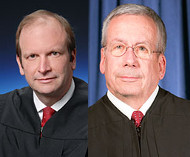12/14/2017
Ohio Supreme Court Rescues Speed Cameras Once AgainA narrow Ohio Supreme Court majority rescues speed cameras from legal challenge by sending case back to a lower court.

A fractured coalition of Ohio Supreme Court justices on Wednesday overruled the General Assembly's attempt at compromise limits on the use of red light cameras and speed cameras in the state. Rather than provide reasoning for their decision, the high court merely referred challenges to camera programs in Springfield and Toledo to the ruling handed down in July regarding a challenge to the photo ticketing program in the city of Dayton (view ruling).
This leaves the matter in the hands of local trial court judges in Springfield and Toledo to decide what this means. Justices William M. O'Neill, Sharon L. Kennedy and R. Patrick DeWine chided their colleagues for punting on this important question.
"The majority was fractured as to the reasoning behind the holding, with no position garnering support from four justices," Justices DeWine and O'Neill wrote in a dissenting opinion. "The lack of a majority view means there is no guidance to be gleaned from Dayton -- the decision adds nothing but more confusion to our general-law jurisprudence. The trial court is in no better position now than when it first heard the case to determine the constitutionality of the provisions it previously addressed that were not addressed by this court in Dayton."
The July ruling held that a number of superficial limitations on the ability of municipalities to use speed cameras (view details) served no legitimate state purpose. So the majority sided with the photo ticketing companies and the cities that wanted to resume issuing tickets without any limitations.
The dissenting justices pointed out that the Dayton decision formally considered just two specific restrictions contained within state law, leaving dozens of additional restrictions commonly found in automated ticketing statutes in other states. For example, for-profit vendors must mail a ticket within thirty days of the alleged offense. There is a limitation on the amount of the fine. There is a requirement for the vendor to maintain and provide maintenance records.
"This court has never addressed these provisions, and Ohio municipalities wait to see whether they must comply with them," Justice DeWine wrote. "Now, they will wait longer -- through another review by the trial court and another review by the appellate court, before coming back here, presumably for this court to determine whether the lower courts correctly applied our nonguidance from Dayton."
Copies of Wednesday's rulings are available in a 150k PDF file at the source link below.


